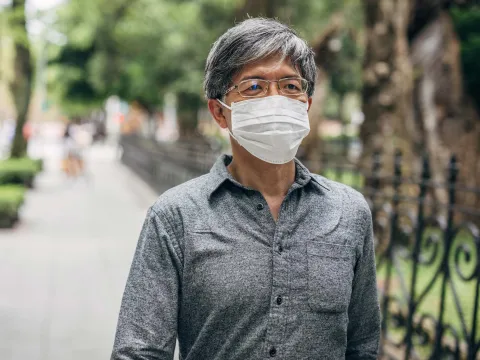- AdventHealth

Every day we continue to see new research relating to coronavirus and how to stop the spread in our communities. We now know that face coverings are critical in helping to protect us against the virus, especially when social distancing can’t be practiced.
So how do face coverings help stop the spread of coronavirus? Is a face shield going to give the same protection as a mask? We’re taking a closer look at these questions to help provide the solutions you need to safely and more confidently go about your day.
Why Do I Need a Face Covering?
An editorial was published in July by the Journal of the American Medical Association (JAMA), proving that cloth face coverings could reduce the spread of coronavirus, especially when used universally within communities. “We are not defenseless against COVID-19,” said CDC Director Dr. Robert R. Redfield. “Cloth face coverings are one of the most powerful weapons we have to slow and stop the spread of the virus – particularly when used universally within a community setting. All Americans have a responsibility to protect themselves, their families, and their communities.”
There is also new evidence that supports cloth face coverings help prevent people who already have coronavirus from spreading their germs to others. Since it is possible to have COVID-19 and not show symptoms, it’s important for all people to wear a face mask — even if they think they are healthy. If you have the virus and are asymptomatic, the mask can help stop the spread, and if you do not have the virus and are healthy, your mask may prevent you from catching the virus from someone else.
The CDC recommends that we wear cloth face coverings in public settings and when around people who don’t live in the same household, especially when social distancing is difficult to maintain.
Will a Face Shield Work Instead of a Cloth Mask?
A face shield is a type of personal protective equipment (PPE) that is made of plastic and generally worn by health care workers in addition to a face mask. Many people wonder if a face shield provides the same level of protection as a face mask, and while they may provide added protection when worn in addition to a mask, we don’t recommend wearing them alone in place of a mask.
If you are social distancing and are able to keep at least 6 feet between you and someone else (who isn’t a member of your household), a face shield isn’t necessary. If you or someone else nearby were to cough, the shield will not contain respiratory droplets as a mask would. The CDC agrees and “does not recommend use of face shields for normal everyday activities or as a substitute for cloth face coverings.”
A face shield may seem like a good alternative, especially in warmer months, but the plastic shield is open underneath your chin, leaving an entry and exit for respiratory particles. This means that a shield is not a suitable substitution for a face mask. A face or eye shield in addition to face covering may afford additional protection by reducing the likelihood of droplets making contact with the eyes.
Who Shouldn’t Wear a Face Covering?
The great majority of people should be wearing masks, or masks with shields, in public settings. However, according to the CDC, face coverings should not be worn by:
-
Anyone who has trouble breathing
-
Anyone who is unconscious, incapacitated or otherwise unable to remove the covering without assistance
-
Children younger than 2
The CDC also recognizes that in certain situations, adaptations and alternatives will need to be considered when wearing a mask isn’t feasible.
More Information
To learn more about the effectiveness of face coverings, visit this page from the CDC. Many of your coronavirus questions are answered on AdventHealth’s Coronavirus Resource Hub, available here.


